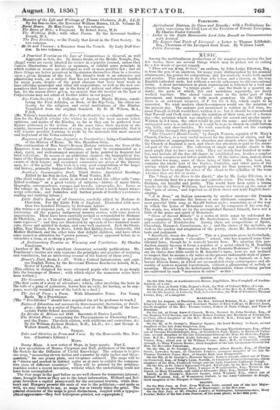MUSIC.
Among the multitudinous productions of the musical press during the last few weeks, there are several things which may be picked out as calling for a few words of special remark. "Thou art my Ring, 0 God," an anthem, by John Lodge Ellerton, Esq., is from the pen of an amateur, for many years distinguished by his musical attainments, his genius for composition, and his masterly works both sacred and secular. This anthem is for four solo voices and a chorus, in the true Fuglish cathedral style, but without a servile adherence to old conventional forms. A short introduction in plain counterpoint is followed by a bold and closely-written fugue "a tempo giusto" ; and the finale is a quartet an- dante the parts of which, free and melodious separately, are finely worked together. The choral voices enter in the latter part of tins movement, and terminate it with much grandeur. On the fifth pap there is an awkward misprint, of F flat for A fiat, which ought to be corrected. We wish modern church-composers would use the notation of the present day. The andante just mentioned is written in 3-2 time, be- cause Purcell or Croft would have written it so : but it should be remembered that Purcell and Croft were using the notation of their own, not of a former day—the notation which was employed alike for sacred and secular music. Written in 3-4 time, the effect would be just the same: and clothing it hi antiquated notes is as affected as it would be to go to church in a full-bottom- wig, frills, and shoe-buckles. We wish somebody would set the example of breaking through this pedantic custom. "The Chanter's Hand-Guide" by Joseph Warren, organist of St. Mary's Church, Chelsea, is a very useful manual for the directors of choirs, and for the members of congregations in churches and chapels where the liturgy of the Church of England is used, and where due attention is paid to the musi- cal part of the service. The collection of single and double chants is the most ample that we have met with. They are nearly four hundred in num- ber, and include all the fine old chants in established use, besides a number by modern composers not before published. Of the latter class, indeed, there are rather too many, some of them being of little merit. The hook, too, contains the whole text of the Psalter, Canticles, and other parts of the service which are chanted, properly pointed for that purpose, with plain directions how to adapt the notes of the chant to the syllables of the verse whether they are few or many. The "Song of the Stars to the Earth," also by Mr. Lodge Ellerton, is a very charming duet for a soprano and contralto voice. The words, from the German, are fanciful and pretty. This would have been quite a bonne bouche for the Misses Williams, had matrimony not broken up the union of this "pair of sirens," and deprived us of their sweet and truly English duet- singing. "A la Rosa," an Italian canzonetta by another amateur—Sir Franck Knowles, Bart.—sustains the honour of our dilettante composers. It is a most graceful little song in the,old Italian style ; reminding us of the way in which the lyrics of Metastasis were set by composers of his own day. The words, too, which are by the accomplished Baronet himself, have not a little of the grace and spirit of Mettistamo. "Gems of Sacred Melody" is a series of little songs by celebrated fo- reign composers with words by Mr. Bartholomew, the well-knowu friend and coadjutor of Mendelssohn. Among them are compositions of Spohr, Cherubim, Hummel, Curschmann, &c. ; and the choice of the melodies, as well as the quality and adaptation of the poetry, shows Mr. Bartholomew's taste and judgment. " Bamboula, donee des Negres." This is a pianoforte piece by Gottschalk, a pianist of the modern " executive " school, who has acquired some Con- tinental fame, though he is scarcely known here. We mention this pro- duction simply because it forms a number of a serial edited by M. Benedict under the title of " Morceaux de Salon des Pianistes Modernes." We would say its choice does little credit to M. Beledict's taste, were we not inclined to suspect that he means a sly satire on the present fashionable style of piano- forte-playing, by exhibiting a production of the day—a fantasia on a bar- barous African dance, in which are accumulated every extravagance and ab- surdity of modern musical legerdemain, without a glimmering of melody or meaning. Heaven help the unfortunate fashionables whose evening parties are enlivened by such morceaux de salon" as this !


























 Previous page
Previous page